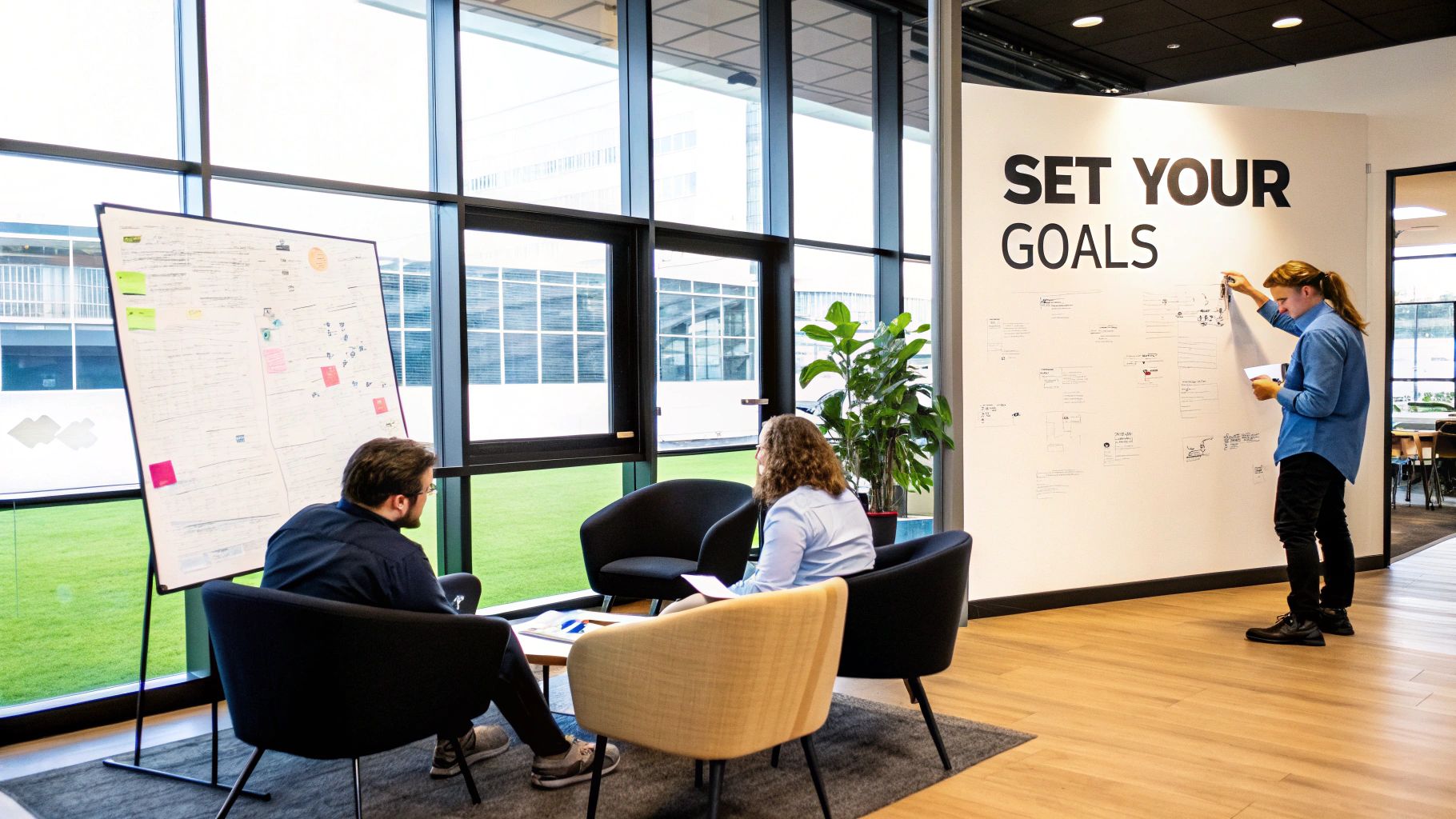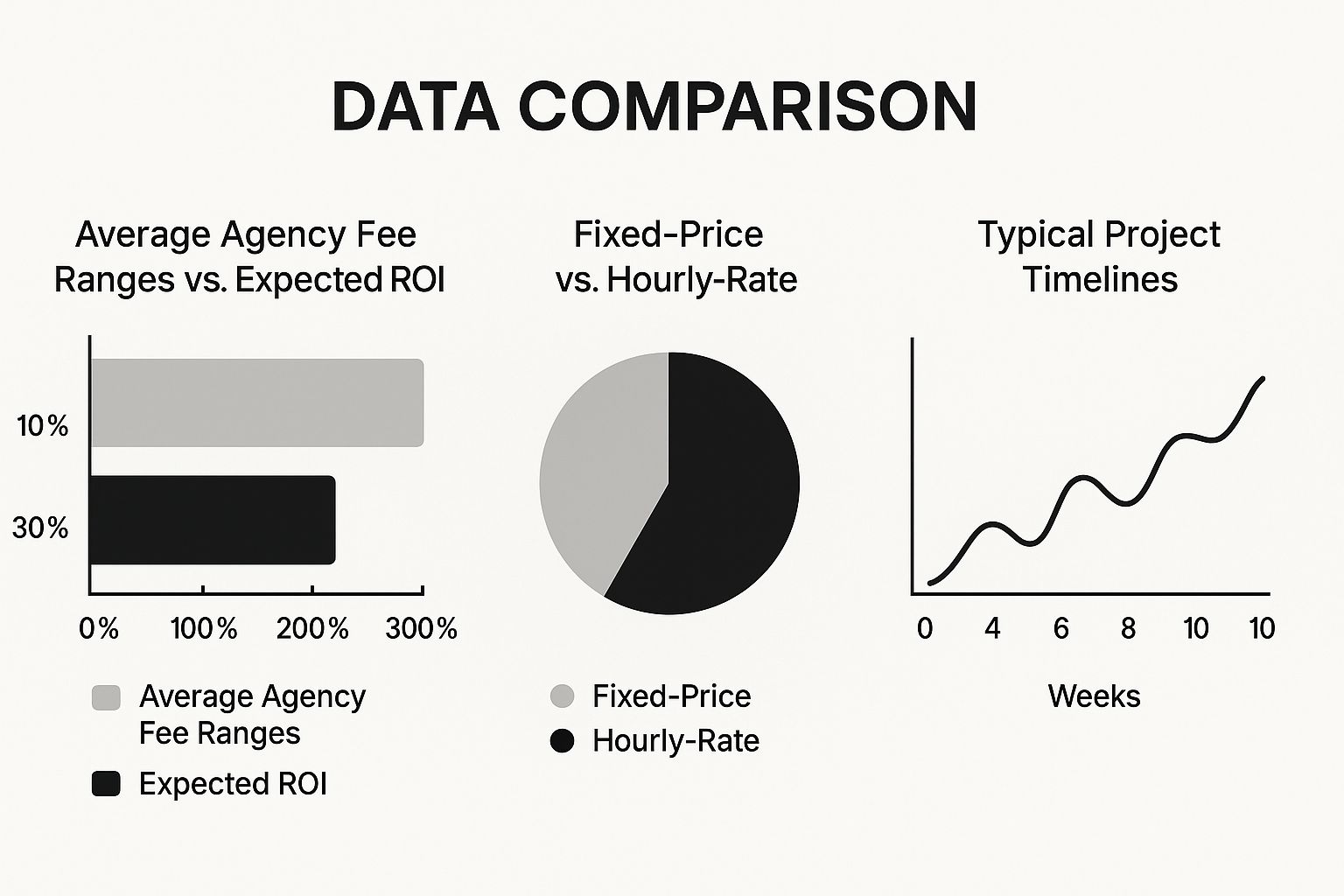Choosing the right creative agency really comes down to one thing: figuring out your own internal vision first. Before you do anything else, you need to know what success actually looks like for you. Only then can you find a partner whose skills, past work, and culture genuinely click with your goals.
The best agency isn't just another vendor you hire. Think of them as a strategic extension of your own team—someone who can deliver real, measurable results.
Get Clear on Your Vision Before You Even Start Looking
Before you even glance at an agency's portfolio, the most important work happens internally. It's simple, really: you can't find the right partner if you don't have a clear map of where you're trying to take your brand.
This first step is all about turning those big business ambitions into a concrete plan that an agency can actually understand and run with.
Let's move past vague goals like "we need to increase brand awareness." Instead, get super specific with measurable outcomes.
- What are the business goals? Do you need to capture 10% more market share in a new demographic?Are you trying to boost online sales by 25% this year?
- How will you measure success? Pinpoint the exact KPIs that matter. We're talking lead generation, conversion rates, customer lifetime value, or social media engagement.
- What services do you actually need? Is it a full brand overhaul? A new e-commerce website? Or maybe a hyper-focused social media campaign? Get it all down on paper.
Crafting a Creative Brief That Gets Results
All that internal clarity comes together in one crucial document: your creative brief. This is your project's North Star. It's how you communicate your scope, your brand values, and your ultimate vision. It’s also your first chance to show you’ve done your homework.
With today’s economic climate, agencies are under more pressure than ever to prove their worth. Many are dealing with tighter client budgets, which means they're looking for partners who can demonstrate clear, measurable outcomes from the get-go.
A great brief doesn't just list tasks. It tells the story of your brand's challenges and where you want to go. It’s the single most powerful tool for attracting an agency that’s truly on the same page.
When you approach agencies with this level of preparation, the entire conversation changes. You stop asking, "So, what can you do for us?" and start saying, "Here's our goal—how would you help us get there?"

This clarity doesn’t just help you pick the right agency; it sets the foundation for a successful partnership. For some great parallel advice on this, our guide on how to hire designers has some excellent insights. A solid strategic foundation makes it infinitely easier to find a partner who can deliver the goods.
Your Agency Selection Criteria Checklist
Before you start shortlisting agencies, use this simple checklist. It'll help you get your priorities straight and force you to think about what really matters for your specific project.
| Criteria | My Priority (High/Med/Low) | Key Questions to Ask Myself |
|---|---|---|
| Industry Experience | Have they worked in my niche before? Do they understand my customers? | |
| Specific Service Expertise | Do they excel at the exact service I need (e.g., brand identity, web dev)? | |
| Portfolio Quality | Does their past work align with my brand's aesthetic and quality standards? | |
| Proven Results/Case Studies | Can they show me data-backed examples of success with similar clients? | |
| Team Structure & Size | Do I prefer a large, full-service agency or a smaller, specialized boutique? | |
| Communication Style | How do they manage projects? Who will be my main point of contact? | |
| Cultural Fit | Do their values and work style seem compatible with my team's? | |
| Budget Alignment | Is their pricing structure clear? Does it fit within my expected range? |
Taking a few minutes to fill this out will save you hours of headaches later. It ensures you’re evaluating every potential partner against a consistent, well-defined set of standards that are tailored to your business.
Reading Beyond the Portfolio
An agency’s portfolio is their highlight reel. It’s supposed to be impressive. But your job is to look past the beautiful designs and slick videos to see what’s really going on.
A great portfolio doesn’t just show what an agency can do; it tells a story of strategic problem-solving. Think of it this way: plenty of people can make something look good. A truly valuable partner makes something that works. This means you’ve got to dig a little deeper to uncover the thinking, the strategy, and—most importantly—the results behind their shiniest work.
First thing I always look for is variety. If every project has the same trendy aesthetic, they might be a one-trick pony. A strong portfolio shows you they can adapt their style to fit different brands, industries, and goals. It’s a huge green flag when you can see they truly listen to their clients instead of just slapping their own signature style on everything.
Looking for Strategic Depth
The best portfolios are more than a gallery of cool stuff; they’re a collection of success stories. You want to see case studies that pull back the curtain and explain the why behind the work. Sure, a pretty logo is nice. But it's way more impressive when an agency can show you how that new design led to a 15% bump in customer engagement.
When you're looking at their projects, ask yourself these questions:
- What was the problem? A good case study always sets the stage. What was the client struggling with before the agency showed up?
- What was the strategy? You want to see a clear explanation of their approach. Why did they make the creative decisions they did?
- What were the results? This is the big one. Did they actually move the needle? I’m talking about concrete metrics—traffic growth, more leads, higher sales. Real numbers.
The most compelling portfolios are the ones that connect creative execution directly to business outcomes. If an agency can’t tell you how their work made an impact, with data to back it up, that’s a major red flag. They might be great artists, but they aren't the strategic partner you need to grow your business.
Finding a Brand Voice That Resonates
Okay, so data is crucial. But you also just need to feel a connection. Does their work feel like your brand? Pay close attention to the copywriting, the visual language, and the overall tone they use. If you’re a playful, energetic startup, an agency whose portfolio is full of stuffy, conservative corporate designs probably isn’t the right vibe for you.
This is where the distinction between a logo and a full brand identity becomes critical. A portfolio should show how an agency builds an entire world around a brand, not just a single graphic. If you want to get a better handle on this, understanding the difference between branding vs. logo design will help you assess their work with a much sharper, more strategic eye.
Ultimately, picking an agency based on their portfolio means you have to be part detective and part strategist. You’re looking for evidence of smart thinking, proven results, and a creative voice that you genuinely believe can represent your brand out in the wild.
Finding a Specialist, Not a Generalist
Let’s be honest: not all creative agencies are created equal. Thinking you can hire any agency for any creative task is a bit like asking a world-class pastry chef to grill you the perfect steak. Sure, they might figure it out, but you’re not playing to their strengths.
The real secret to finding an agency that actually delivers is matching their core specialty to what your business really needs to accomplish.

Some agencies are branding powerhouses, true masters of forging unforgettable identities from the ground up. Others are digital wizards who live and breathe performance marketing, SEO, or complex web development. Many carve out a very specific niche, dedicating themselves to industries like B2B SaaS, CPG, or healthcare.
Hiring a jack-of-all-trades for a specialist’s job is a recipe for lukewarm results.
How to Spot True Expertise
To find a real specialist, you have to look past the sales pitch and become a bit of a detective. An agency’s genuine expertise isn't just in what they say—it’s hidden in the patterns of their work, their team's résumés, and the topics they obsess over publicly.
Start by digging into their client history. If you're a direct-to-consumer e-commerce brand, does their portfolio look like a who's who of B2B software companies? While they might be incredibly talented, they probably don't have a gut-level understanding of your customer journey, conversion funnels, or the specific platforms you live on.
Next, hit up their team page or LinkedIn profiles. You're looking for deep, relevant experience in the areas that matter most to you. If you need a viral social media campaign, you should find social strategists and content creators with a proven track record of, well, making things go viral—not just a team of general account managers.
Specialization in the Digital World
This is especially critical when it comes to digital marketing. For many brands, particularly startups, it can be tough to even know what you need. A good digital marketing for startups guide can help you clarify what kind of specialization will move the needle for you.
The numbers don't lie. Globally, social media ad spend is on track to hit a massive $276.7 billion in 2025, reaching an audience of 5.42 billion users. Agencies that specialize in platforms like Facebook (with its 3.065 billion monthly active users) are in high demand for a reason—they have the deep, platform-specific knowledge that actually drives results.
Choosing an agency with proven, niche-specific success isn't about being picky—it's about managing risk. You're not paying them to learn your industry on your dime. You’re paying for existing expertise they can put to work from day one.
Questions That Uncover Their Specialty
When you're talking to a potential agency, don't be afraid to get specific. These questions are designed to test their depth of knowledge:
- What are the most common challenges you see for businesses in our industry, and can you walk me through how you've solved them?
- Could you share a case study from a client with a business model just like ours?
- Which team members would actually lead our account, and what’s their direct experience in [your key area of need]?
Their answers will quickly separate the real specialists from the generalists pretending to be one. Putting in this diligence upfront ensures you find a partner who is truly equipped to navigate your market and deliver the results you need.
Decoding Agency Pricing and Finding True Value
Let's talk about the big one: money.
Getting proposals from different creative agencies can feel like you're trying to compare apples, oranges, and maybe even a dragon fruit. To find a partner who’s genuinely right for you, you have to get comfortable with the financial side of things and learn how to see the real value behind the price tag.
That number at the bottom of the proposal? It’s just the beginning of the story. The real goal is to figure out exactly what you’re getting for your investment and make sure it lines up perfectly with what you’re trying to achieve. The way an agency structures its pricing tells you a lot about how they work.
Unpacking Common Pricing Models
Most agencies stick to a few core pricing models. Each one has its own vibe and works best for different kinds of projects. Getting a handle on these is your first step toward making a smart financial choice.
Here's a breakdown of the most common structures you'll encounter:
Comparing Common Agency Pricing Models
This table breaks down the different ways agencies might charge you, helping you figure out which model makes the most sense for your specific project.
| Pricing Model | Best For | Pros | Cons |
|---|---|---|---|
| Project-Based Fees | One-off, well-defined projects (like a new website or a logo design). | Clear, predictable costs. You know the total price upfront. | Less flexible if the project scope changes. Requires a very detailed brief. |
| Monthly Retainers | Ongoing work (like SEO, social media, or content creation). | Fosters a long-term partnership. Consistent access to the agency's team. | Can feel like you're paying even during slower months. Requires clear deliverables. |
| Value-Based Pricing | Projects where results are easily measured (like lead generation or sales campaigns). | The agency is invested in your success. You only pay for tangible results. | Can be more complex to set up and track. Less common for purely creative work. |
Picking the right model really comes down to what you need. A quick, defined project is perfect for a fixed fee, while a long-term marketing push is better suited for a retainer.
The infographic below gives you a bird's-eye view of key industry data points—think average fees, popular pricing models, and typical project timelines—to help you benchmark the proposals you receive.

As you can see, there’s usually a direct link between how much you invest and the results you can expect. It really underscores how important it is to match the pricing model to your project's goals and complexity.
Beyond the Price Tag
A cheap proposal is rarely the best proposal.
True value isn't just about saving a few bucks. It's in the strategic thinking, the deep expertise, and the tangible results an agency delivers. Recent industry benchmarks show a pretty wide range in what agencies charge. About a third of them are in the $175-$199 per hour range, and another 32% bill between $200-$249 hourly.
Those numbers reflect the level of expertise you're paying for, so it's all about striking a balance between your budget and your need for specialized skills. To get a feel for how other professionals structure their fees, it's helpful to understand the financial aspects of external services outside the creative world. A broader perspective always makes you a smarter buyer.
The best financial conversations are transparent. Don’t be afraid to ask direct questions about what is—and what isn’t—included in a proposal. A great partner will welcome the clarity.
One of the biggest risks in any project is "scope creep." It’s that sneaky process where small, innocent requests start piling up, slowly pushing the project beyond its original plan and leading to surprise costs. A solid proposal will always have clear terms for how extra work is handled.
Before you sign anything, it’s worth reading up on how to manage scope creep so you know what to look for. By asking the right questions and understanding the value behind the numbers, you can choose a creative agency that not only respects your budget but becomes a powerful engine for your growth.
Finding a True Partner, Not Just a Vendor

Let’s be real. An amazing portfolio might get an agency on your shortlist, but it's the human element that truly seals the deal. The best creative work isn’t just born from talent; it’s built on trust, open communication, and a genuine sense of partnership.
A gallery of stunning past projects means very little if the day-to-day collaboration feels like pulling teeth.
So when you're figuring out how to pick an agency, you need to spend just as much energy gauging the culture fit as you do reviewing their case studies. You're not just hiring a service provider; you're bringing on a team that should feel like a natural extension of your own.
This alignment is the secret sauce for a productive and, frankly, enjoyable long-term relationship.
Can You Vibe With Them?
From that very first email or call, pay close attention to the vibe you're getting. Are they listening more than they're talking? Are they asking smart, insightful questions about your actual business challenges, or did they just jump straight into a canned sales pitch?
That initial discovery call is a goldmine.
A true partner is curious. They want to dig in and understand your pain points, your customers, and your big-picture vision before they even think about proposing a solution. A vendor just wants to sell you something.
The goal is to find a team that’s genuinely invested in your success, not just in closing another deal. When you shift from a client-vendor dynamic to a collaborative partnership, that's where the magic happens.
If their team seems legitimately excited about your project and is already riffing on ideas with you, that’s a huge green flag. On the flip side, if they seem distracted or rush through your questions, that’s a pretty clear sign of what you can expect down the road.
Key Questions to Uncover the Real Culture
To get past the surface-level pleasantries, you need to ask questions that reveal how they operate under pressure. Their answers will tell you everything you need to know about what it’s really like to work with them.
Try weaving some of these into your conversations:
- "Can you walk me through your process for handling constructive feedback or a major pivot in project direction?" This tells you a ton about their flexibility and ego. A great partner sees feedback as a tool for collaboration, not a personal critique.
- "Who would be my day-to-day point of contact, and what does your communication flow look like?" This sets clear expectations from the start. It helps you know if you'll have a direct line to strategists or be funneled through an account manager.
- "In your eyes, what does the ideal client relationship look like?" This is a simple but powerful question that forces them to describe their core values. Listen for words like "collaboration," "transparency," and "partnership."
It's also crucial to understand how they handle the tough stuff. For instance, knowing their philosophy on managing client relationships gives you a window into how they'll navigate the inevitable bumps in the road. This is huge, especially since learning how to deal with demanding clients is a skill every top-tier agency must have.
Finding a partner who can navigate those waters with grace is absolutely invaluable.
Your Agency Selection FAQ
Okay, you're in the final stretch of picking an agency. This is where a lot of important questions pop up. Getting straight answers is the only way you'll feel truly confident pulling the trigger.
We get it. We've seen hundreds of businesses in your exact position. So, let's cut through the noise and tackle the most common questions we hear.
How Long Should This Whole Thing Take?
There's no magic number, but a solid, thorough process usually lands somewhere between four to eight weeks. That gives you enough breathing room for the initial digging, shortlisting a few contenders, hopping on intro calls, digging into proposals, and having those final "gut check" conversations about culture fit.
The biggest mistake we see? Rushing it. Give yourself the time to really understand how they think, not just how well they sell. A great partner will respect that you're being deliberate.
What Are the Biggest Red Flags I Should Watch Out For?
You’ll want to keep an eye out for a few things that should give you pause. If an agency just agrees with everything you say and never pushes back or offers a new perspective, be wary. You're hiring a partner to challenge you and bring fresh ideas, not a yes-man.
A few other major red flags to keep on your radar:
- Fuzzy Answers: If they're vague about their process, how they price things, or what success looks like, that's a problem. Clarity is everything.
- The Cookie-Cutter Pitch: Your business isn't generic, and their strategy shouldn't be either. If it feels like a canned presentation, it probably is.
- High-Pressure Tactics: Anyone trying to rush you into signing a contract has their own interests at heart, not yours. That's a huge red flag.
Trust your gut here. Seriously. If a conversation feels off or a promise sounds way too good to be true, it almost always is. The best partnerships kick off with transparency and mutual respect from day one.
Should I Ask for a Test Project?
This one’s a double-edged sword. On one hand, a small, paid test project can give you a fantastic real-world feel for how they work and if you click creatively. On the other hand, a lot of top-tier agencies will say no. Their portfolio and case studies are their proof.
Here's an alternative: instead of a test project, ask them to do a deep dive on a past project that’s similar to your needs. Make them explain the why behind every decision. You can learn just as much from that conversation as you would from a test. A strong agency will have a rock-solid rationale for their choices, which is exactly what you need when you're thinking about how to build a brand strategy.
At the end of the day, you just need to feel confident they can turn your business goals into creative that works. How you get to that feeling is less important than the confidence itself.
Ready to find the perfect creative partner for your next project? Creativize connects you with top-tier local talent specializing in everything from brand identity to motion graphics. Browse portfolios, read verified reviews, and build your dream team today. Find your creative match on Creativize.

